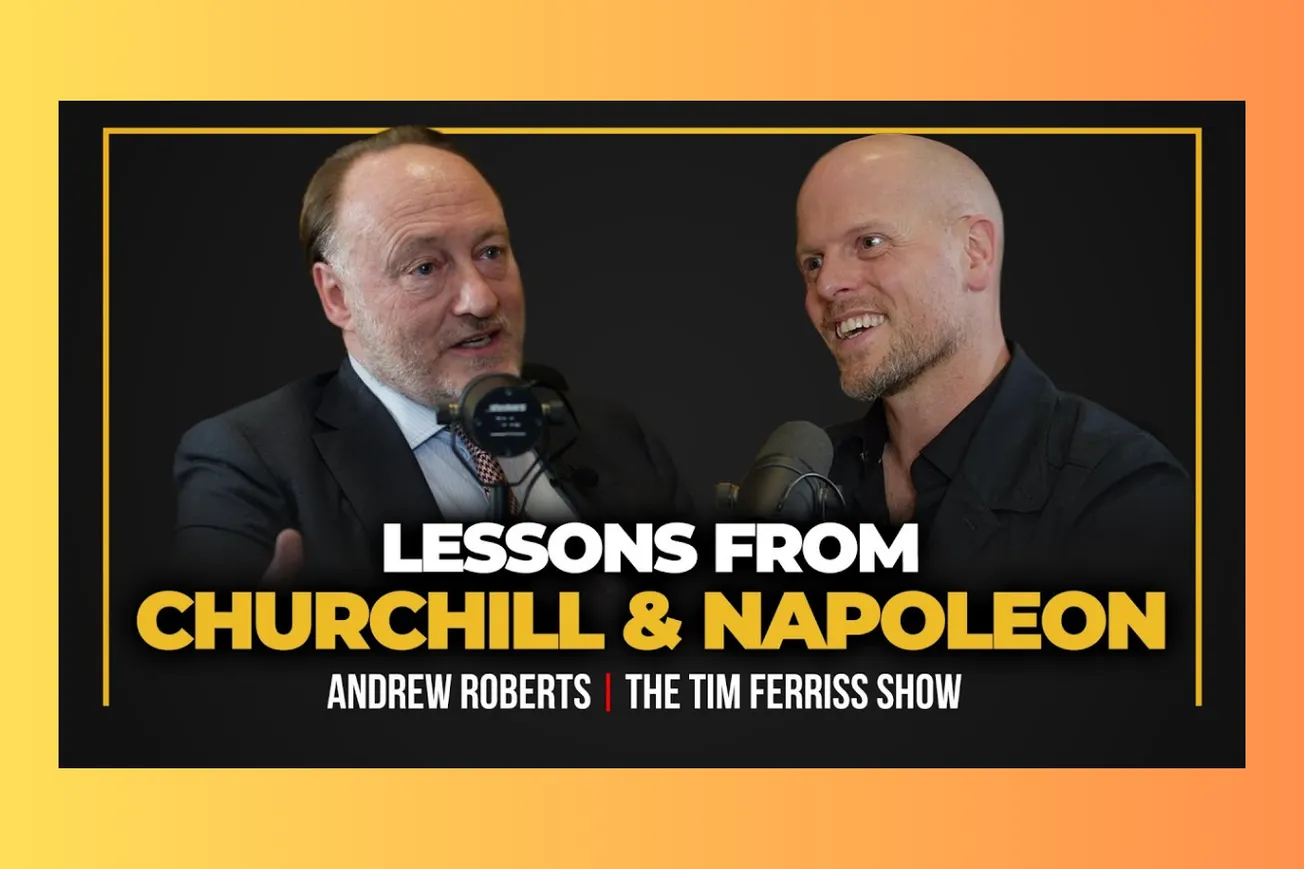Table of Contents
Historian Andrew Roberts reveals how Churchill and Napoleon mastered crisis leadership through study, resilience, and calculated risk-taking.
Key Takeaways
- Both Napoleon and Churchill developed steady nerves through military education and extensive reading of classical strategists
- Churchill's resilience stemmed from learning systematically from every major mistake throughout his political career
- Napoleon revolutionized warfare through the core system, allowing armies to march separately but fight together
- Great leaders summon historical context to inspire followers, placing current struggles within larger narratives
- Democratic criticism helped Churchill avoid the hubris that ultimately destroyed Napoleon's decision-making
- Churchill believed ages 20-25 offer unique forgiveness for mistakes, making this the prime time for calculated risks
- Studying history provides "all the secrets of statecraft" according to Churchill's advice to young people
- Personal destiny beliefs, while potentially dangerous, drove both leaders to attempt seemingly impossible achievements
Timeline Overview
- Opening Discussion — Roberts reflects on British cultural pessimism and the decline in pride over national history
- Early Formation — How Christopher Perry's narrative teaching style and family castle visits shaped Roberts' historical passion
- Writing Methodology — Roberts explains his approach to avoiding hedging words and maintaining reader trust through certainty
- Napoleon's Military Genius — Analysis of the core system, risk-taking, and the emperor's comprehensive approach to warfare
- Churchill's Resilience — Discussion of steady nerves, learning from mistakes, and the power of historical perspective in leadership
- Personal Practices — Roberts reveals his diary-keeping habits, writing routines, and collaboration with editor Stuart Prophet
- Historical Perspective — The importance of objective imperial history and concerns about cultural suicide in modern education
- Future Outlook — Pessimistic views on Britain's self-confidence and the danger of removing historical figures from public memory
The Foundation of Unshakeable Leadership
- Napoleon and Churchill both received formal military education that provided intellectual frameworks for handling massive responsibilities as their commands grew exponentially over time. This systematic preparation proved crucial when they later controlled the fates of hundreds of thousands of men in life-or-death situations.
- Both leaders spent their youth intensively studying classical military figures like Julius Caesar and Alexander the Great, developing what Roberts calls a "Holy Fire" - an unshakeable belief that their missions were morally imperative and historically necessary.
- Churchill's autodidactic approach during his early twenties in India set him apart from contemporaries who spent midday heat sleeping. He read Gibbon, Macaulay, and Shopenhauer, cutting himself off socially but building the philosophical foundation that would later inform his oratorical style and worldview.
- The concept of noblesse oblige deeply influenced Churchill's leadership philosophy, creating a medieval-style obligation where privilege demanded service to protect "widows and orphans" and work for the greater community good.
- Napoleon's literary background as both reader and writer of short stories gave him unique insight into human psychology, which he leveraged to understand and outmaneuver enemy generals by anticipating their decision-making patterns.
- Their extensive reading created leaders who could place immediate crises within vast historical contexts, a skill that proved essential for maintaining perspective during their darkest moments and inspiring others to persevere.
The Art of Crisis Management
- Steady nerves under extreme pressure distinguished both leaders from their contemporaries, with this self-control being "much more nurture than nature" according to Roberts' analysis of their developmental patterns.
- Churchill's ability to learn systematically from mistakes set him apart from typical politicians - he analyzed failures in female suffrage, the abdication crisis, the gold standard, and the Dardanelles disaster, extracting actionable lessons from each setback.
- Democratic criticism played a vital role in preventing Churchill from developing the hubris that ultimately destroyed other great leaders. Constant House of Commons challenges forced him to defend decisions logically and rationally, keeping his ego in check.
- Napoleon's core system revolutionized military strategy by creating "mini armies" that could march separately but converge for battle, allowing one core to engage enemies while others maneuvered for envelopment - a tactical innovation that dominated European warfare until enemies adopted similar approaches.
- Both leaders understood that appealing to soldiers' souls was as important as tactical brilliance. Napoleon's famous declaration before the Battle of the Pyramids - "40 centuries look down upon you" - placed individual soldiers within the grand sweep of history.
- Churchill similarly drew on historical precedents in roughly 10% of his 1940 speeches, reminding Britain that the nation had survived previous existential threats through figures like Francis Drake and Admiral Nelson, creating continuity between past victories and present struggles.
The Psychology of Calculated Risk-Taking
- Napoleon's Italian campaign at age 26 demonstrated extraordinary risk-taking that normal generals would never attempt, but his systematic study of 30-year-old strategic texts by the Compte de Guibert provided intellectual justification for seemingly reckless decisions.
- Churchill's belief that people forgive mistakes made between ages 20-25 created a philosophical framework for taking calculated risks during youth, when reputation damage could be recovered more easily than later in life.
- Napoleon's famous preference for "lucky" marshals reflected his understanding that successful risk-taking requires both preparation and favorable circumstances, leading him to promote officers he believed possessed intuitive timing and judgment.
- The decision to march on Moscow in 1812 represented Napoleon's greatest strategic gamble - Roberts argues this wasn't pure hubris but a calculated risk based on previous victories over Russian forces and army size advantages that could have succeeded with different timing.
- Both leaders developed psychological techniques for understanding enemy mindsets, with Napoleon particularly skilled at identifying weak points between allied forces and exploiting psychological divisions among opposing commanders.
- Risk assessment improved through experience, as Napoleon's early Italian campaign victories (winning 19 of 20 battles) created confidence that seemingly dangerous decisions were actually well-calculated moves with high probability of success.
The Power of Historical Perspective
- Churchill's advice to a young American student in 1953 crystallized his philosophy: "Study history, study history, for therein lies all the secrets of statecraft" - making historical knowledge the foundation of effective governance.
- Both leaders consciously positioned their contemporary struggles within vast historical narratives, with Churchill referencing Britain's previous survival of existential threats and Napoleon connecting Egyptian campaigns to the grandeur of ancient civilizations.
- Roberts emphasizes that explaining charisma and charm through written history remains nearly impossible, yet these intangible qualities often determine which leaders achieve mythic status while others fade into obscurity despite significant accomplishments.
- The practice of keeping detailed diaries provided Roberts with daily motivation, creating sense that life experiences wouldn't be "a complete waste of time" and establishing written records that could outlive physical monuments and statues.
- Historical education through narrative storytelling, as demonstrated by Roberts' teacher Christopher Perry, transforms dry facts into compelling human dramas that students remember decades later through voice acting and cross-legged desk performances.
- Modern educational failures, including British teenagers believing Churchill was fictional while Sherlock Holmes was real, demonstrate how poor historical instruction undermines national self-confidence and cultural continuity across generations.
Writing, Learning, and Intellectual Discipline
- Roberts' rejection of hedging words like "perhaps," "probably," and "maybe" stems from his belief these represent intellectual laziness - writers should research thoroughly enough to make definitive statements or clearly signal uncertainty through phrases like "it is said that."
- The collaborative relationship with editor Stuart Prophet demonstrates how effective feedback requires someone "profoundly committed to history" who can ask penetrating questions like "How wide was the river Po in 1796?" that force writers to consider reader perspectives.
- Writing in flow states sometimes requires sacrificing personal hygiene for days when tackling complex chapters, as Roberts admits to staying in dressing gowns for up to three days to maintain concentration on intricate historical sequences like May 10, 1940.
- Daily diary writing serves as both relaxation and legacy creation, with Roberts recording approximately 500 words maximum focused on the most interesting daily events, typically completed in pajamas and slippers with morning coffee.
- Dr. Johnson's advice to "read your most brilliant purple paragraph again and rip it up" provides essential humility checks, as writers often mistake self-congratulatory passages for genuinely excellent prose that serves readers' interests.
- The process of systematic mistake analysis, demonstrated by Churchill's career-long pattern of extracting lessons from failures, can be applied to any profession requiring continuous improvement under pressure and public scrutiny.
Cultural Memory and National Identity
- Statistical decline in British historical pride from 86% to 56% between 2010-2015 reflects sustained attacks on imperial history that ignore positive contributions like slavery abolition while emphasizing only negative aspects of empire.
- Roberts views removal of Thomas Jefferson statues as "cultural suicide," arguing that founders deserve recognition for constitutional achievements and courage against powerful empires despite personal moral failures like slave ownership.
- The "Henry to Hitler" approach in British education creates dangerous knowledge gaps by jumping from Tudors to World War II while ignoring crucial intervening periods like the Stuart Civil War and Hanoverian developments.
- Survey results showing 20% of British teenagers believe Churchill was fictional while considering Sherlock Holmes and Eleanor Rigby real people indicate systematic educational failures that undermine cultural foundation and national self-understanding.
- Objective historical writing should avoid Marxist assumptions that white imperial expansion was solely motivated by exploitation, recognizing that noblesse oblige and genuine improvement motives drove many missionaries, explorers, and administrators.
- Breaking "living links with the past" through statue removal and historical revisionism threatens the cultural continuity that Roberts believes makes nations great, creating identity crises that weaken future national confidence and achievement.
Churchill's advice to study history remains as relevant today as when he offered it in Westminster Hall. Understanding how great leaders developed steady nerves and learned from mistakes provides timeless guidance for navigating modern challenges with both wisdom and courage.





